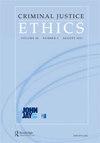Prisoner Interpretations and Expectations for the Ethical Governance of HMIP Survey Data
Q2 Social Sciences
引用次数: 1
Abstract
The value of and the need for rich data for criminal justice research is increasingly apparent, especially following recent restrictions on primary data collection due to COVID-19. Whilst the benefits of using administrative data for research are well established, less understood are the perspectives of data contributors and their expectations for the ethical governance and use of these data. This study describes the findings from a preliminary study comprising four focus groups with a total of seventeen adult males serving sentences in a Category A prison in England. Participants were asked to offer opinions about the possibility of making survey data collected from them as part of the prison inspection process more widely accessible, beyond the organizational priorities for which it was initially collected. Generally, participants were content for survey data to be shared with recipients who intended to use the data to bring about change within prisons; this aligns with the purpose for data collection. Participants were opposed to data being made accessible to recipients who might produce spurious findings. We discuss implications for the future accessibility of a vast wealth of prisoner survey data in England and Wales and highlight the importance of consultation with incarcerated persons on this subject.囚犯对HMIP调查数据伦理治理的解释与期望
刑事司法研究对丰富数据的价值和需求越来越明显,尤其是在最近由于新冠肺炎而限制初级数据收集之后。虽然使用行政数据进行研究的好处已经得到了很好的证实,但人们对数据贡献者的观点以及他们对道德治理和使用这些数据的期望却知之甚少。这项研究描述了一项初步研究的结果,该研究包括四个焦点小组,共有17名成年男性在英格兰a类监狱服刑。参与者被要求就是否有可能在最初收集调查数据的组织优先事项之外,更广泛地获取作为监狱检查过程一部分从他们那里收集的调查数据发表意见。一般来说,参与者满足于与接受者分享调查数据,接受者打算利用这些数据在监狱内带来改变;这符合数据收集的目的。参与者反对将数据提供给可能产生虚假调查结果的接受者。我们讨论了对英格兰和威尔士未来获取大量囚犯调查数据的影响,并强调了就这一问题与被监禁者协商的重要性。
本文章由计算机程序翻译,如有差异,请以英文原文为准。
求助全文
约1分钟内获得全文
求助全文

 求助内容:
求助内容: 应助结果提醒方式:
应助结果提醒方式:


